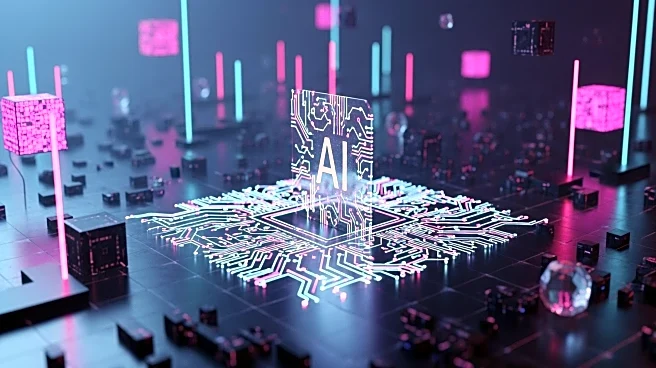What's Happening?
The latest installment in the Tron franchise, 'Tron: Ares,' directed by Joachim Rønning, delves into the theme of the digital world invading the human realm. The film features AI super soldiers causing destruction in human cities, raising ethical questions about artificial intelligence. The story follows Eve Kim, played by Greta Lee, who discovers a 'permanence code' left by her late sister, an AI optimist. Julian Dillinger, portrayed by Evan Peters, seeks to retrieve this code using his AI soldiers, Ares and Athena. The film attempts to balance style and substance, borrowing elements from previous Tron films while introducing new narrative complexities.
Why It's Important?
The film's exploration of AI ethics is significant as it reflects current societal concerns about the role of artificial intelligence in human life. By depicting AI soldiers and their potential for benevolence, 'Tron: Ares' contributes to the ongoing debate about AI's impact on society. The film suggests that AI's actions depend on the intentions of its creators, highlighting the importance of ethical considerations in technology development. This narrative resonates with industries and policymakers grappling with AI regulation and its implications for security and human rights.
What's Next?
The film's ending and mid-credits scene hint at future developments in the Tron franchise, potentially involving a meeting between Ares and Quorra, a character from 'Tron: Legacy.' This suggests that the franchise may continue to explore the intersection of AI and human experiences, possibly expanding on the ethical dilemmas introduced in 'Tron: Ares.' The film's box office performance and audience reception will likely influence the direction of future installments.
Beyond the Headlines
The film's narrative draws parallels to Mary Shelley's 'Frankenstein,' emphasizing themes of creation and sentience. This connection underscores the timeless nature of ethical questions surrounding technology and human innovation. 'Tron: Ares' challenges viewers to consider the consequences of AI development and the responsibilities of creators in shaping the future of technology.










